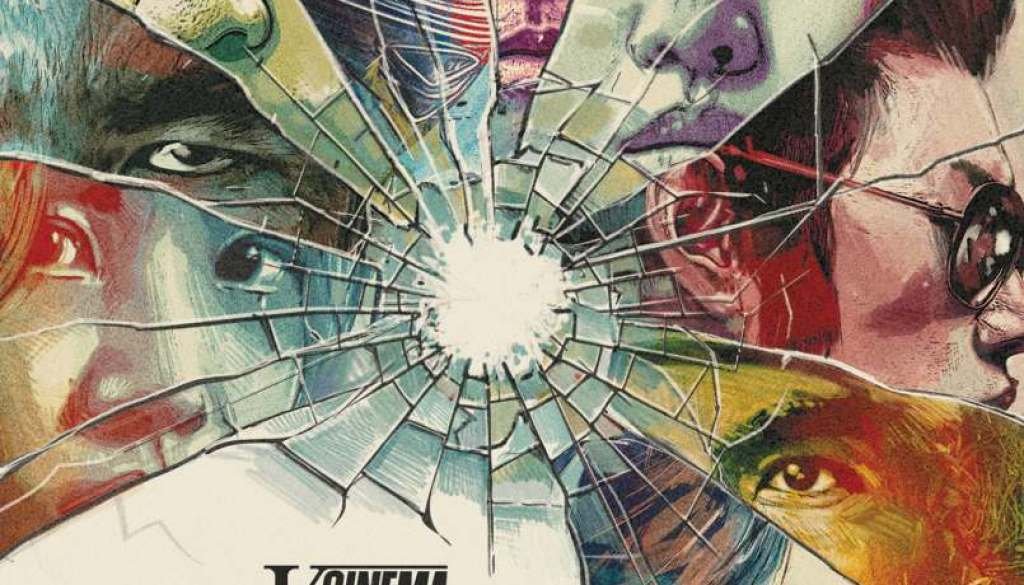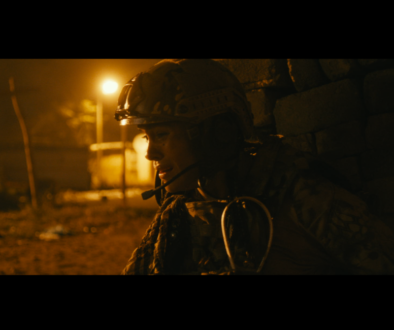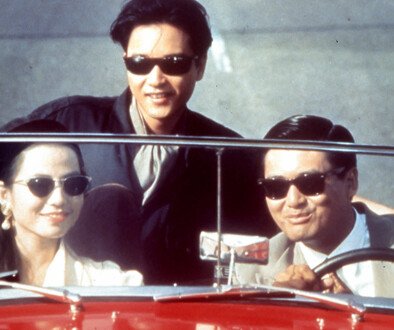Arrow Video’s V-Cinema Essentials: Bullets & Betrayal Review – Part Four: THE HITMAN: BLOOD SMELLS LIKE ROSES and DANGER POINT: THE ROAD TO HELL
Anchors:
• THE HITMAN: BLOOD SMELLS LIKE ROSES
• DANGER POINT: THE ROAD TO HELL
• CONCLUSION
TW: This review briefly discusses a scripted situation of sexual violence.
My coverage of Arrow Video’s V-Cinema Essentials: Bullets & Betrayal boxset continues this week with perhaps one of the most fun titles included in the mix. It comes from Teruo Ishii, who I previously gave a spotlight to in a review of Eureka’s Prison Walls trilogy, which you can read here if you’re up to it.
For this, we turn to Ishii’s 1991 action thriller, The Hitman: Blood Smells Like Roses, an adaptation of Masahiro Nakamura’s novel. The movie stars actor and singer Hideki Saijo, whose title track, “Mad Dog,” is a lively, high-energy component crucial to the aesthetic of the liberating vibe that was characteristic of V-Cinema at the time; Ishii, like his colleagues, were given ample reign to create and deliver the goods: a handsome lead, beautiful seductresses, sex and nudity, hard-hitting and brutal action, big explosions, and some kickass music to package it all. Coupling these with a gripping, straightforward tale of revenge under ninety minutes, Ishii definitely doesn’t disappoint.
For starters, we meet Yujiro (Saijo), a man who – not for nothing – has since decided to make it his life’s mission to be a living, breathing problem for the yakuza. None of this would be happening if the bloody turf war between the Mitsuyoshi and Kamasa families didn’t result in the Kamasa crime boss pulling Yujiro’s fiancée in the heat of a gunfight in a restaurant and using her as a human shield.
Alas, far be it for Yujiro to waste an opportunity to put a bullet into a trio of yakuzas; the precursor to this is that the three gangsters attempt to gang-rape an innocent woman in the middle of the night in a remote area, a scene that plays out a bit long at first, which makes Yujiro’s violent entry a welcome feat. That’s the level of zero-tolerance we get from our dark hero early on – a widower in mourning with nothing but vengeance on his mind, and for that matter, a particular set of skills that make him the ultimate equalizer.
Backed by close friend and high-ranking cabinet official Nakatsuka (Kiyoshi Nakajo), Yujiro’s only focus is to pit the two families against one another while singlehandedly bringing an end to their reign of terror on the streets. Little does Yujiro know that his quest will result in a reluctant partnership with Rumi (Natsumi Nanase), a free-wheeling, club-hopping beauty with debts of her own to settle until helping Yujiro becomes top priority. The rising bodycount in Shinjuku hasn’t gone unnoticed though, especially with dogged detective Uchino (Tetsuro Tanba) intent on bringing his case to a close.
The result is as rewarding, feature-length delight in The Hitman: Blood Smells Like Roses. Proffering a simple revenge tale with easy-to-understand nuances and dramatization, Saijo’s Yujiro is a profile in old-school romanticism. He’s a man in love, and for a story whose screenwriter and director doesn’t hesitate to throw beautiful (and very naked) women in Yujiro’s direction, our hero largely abstains as a man still very much going through something that would naturally inhibit someone from genuinely loving another person. To be fair, however, there is one scene where Rumi walks in on Yujiro in the shower, naked, locking eyes and openly offering herself to him before cutting to the next story point. Whatever might have happened in that time frame is entirely up to the viewer.
Tanba’s Uchiro, who also goes by the name “Dick” with his colleagues, is unwavering in his efforts to get to the truth. Interestingly, he’s more empathetic and pragmatic than anything. He’s bent on closing his case, but at his core, his interest lies mainly on understanding Yujiro and his mystery role amid all the gang warfare. He even goes so far as to interrogating a yakuza while he’s dying in mid-surgery, which is also hilarious in its own right considering Uchino’s reasoning.
I got a thrill out of Ishii’s adaptation from top to bottom as a tightly-woven, explosive revenge thriller with modifiers aplenty to keep the audience pulled in. There’s even an extra dose of tragedy thrown into the second half that propels our hero into his final confrontation, allowing for an exciting showdown and a climatic finish.
Indeed, Ishii – for his final action movie – assures his target audience with just as much skin and sultry imagery to balance things out. The rolling end-credits has “Mad Dog” playing in the background to a slideshow of photos – in case the vibe here was too vague – illustrating guns, naked women, and naked women holding guns. At this point, the only thing it was missing were images of guns holding naked women… but, I digress.
These aesthetics and more are also central in the film’s accompanying eight-minute video essay by Frankie Balboa (better known by his followers on social media as TimesSquareKungFu on YouTube and ShogunSupreme on BlueSky), in which he talks up Ishii’s versatile and legendary filmography, all leading up to Ishii’s 1991 action thriller starring the late Saijo. To top it all if, this side of the disc also comes with a trailer.
There’s no trailer available on the disc, however, for the boxset’s eighth offering, Danger Point: The Road To Hell (clearly I’ve had to supplement it from Toei’s YouTube channel at the bottom), but that doesn’t make the film any less enjoyable, and on Blu-Ray no less. The film comes from director Yasuharu Hasebe whose filmography stretches back to the sixties, with multiple shared credits featuring Showa-era starlet, Meiko Kaji of Female Prisoner Scorpion and Stray Cat Rock fame.
Hasebe brings a cast together led by Show Aikawa and Joe Shishido (read more about their performances here in my first part of this review series for Neo Chinpira: Zoom Goes The Bullet), in a buddy format that centers on two contract killers, Ken and Joji. Their latest job brings a series unintended consequences, unraveling a sordid tale of lust, greed, and revenge upon tracking down a dirty, albeit former cop named Sakai (Junya Sato).
The disgraced ex-lawman utters dying words usher in an a saga filled with intrigue and mystery, involving a trio of ensnared gangsters in search of millions of dollars in stolen cash, and Yumi (Nana Okada) an innocent nurse caught in the crossfire. What’s more is that the killers’ inquisition forces their handler to sever ties for breaking protocol, resulting in the pair taking matters in their own hands. As Ken and Joji manage to rope Yumi in, they soon realize the closer they get to the truth – and quite possibly the money – the closer they are to whatever danger awaits them. What remains to be seen is whether or not it will be too late before they can reap the fruits of their scheme.
Hasebe’s Danger Point: The Road To Hell begins almost as poetically as it ends as we follow Ken and Joji. The discernible age difference between the two contributes a great deal to their personalities with Ken being the younger, more rambunctious, and Joji being the wiser and cooler-headed. It’s worth noting they both have their hot streaks and when pushed, aren’t afraid to lash out and get rough when they need to.
They’re also pretty scummy to their own degrees, being killers with a penchant for beating women at times. They’re crooks, doing what crooks do, and for the sake of the story, featuring a crooked duo in world rife with other foes, Hasebe surely has you rooting for them in classic fashion, with the antagonistic Takahashi played swimmingly by co-star Hideo Murota, alongside actress Miyuki Ono in the role of Saeko. Actress Okada lends the film’s more ebullient performance as Yumi, a catalystic placeholder for Joji and Ken who considers himself more learned than he is on women and matters of trust.
Culminating an allegorical tale of crime, passion, and greed, Hasebe’s Danger Point: The Road To Hell lays thick a storied groundwork that tops it all with action, sex, violence and dark allure that all coincide with old adages about how crime doesn’t pay. It’s a twisty, lively tale as well, with a cast of characters that perfectly illuminate the vibe of V-Cinema in its heyday, and something fans can easily take to in their cult genre enjoyment.
That intake continues on this side of the disc as well, with James Balmont’s fourteen minute video essay which goes into the historical careers of the stewards of V-Cinema, including actor Shishido, as well as more on Danger Point: The Road To Hell, and its role in the legacy of Toei’s home video brand. It’s a bit more of the same from the first disc’s features, but it it’s definitely not a bore, particularly for a boxset spotlighting a vast field of film long unknown if you weren’t as exposed to this kind of market growing up, especially Nikkatsu and their Roman Porno films, so, yeah. Worth it.
If you enjoyed this article, please consider donating to my Buy Me A Coffee page and supporting my work to keep me going.
Native New Yorker. Been writing for a long time now, and I enjoy what I do. Be nice to me!





